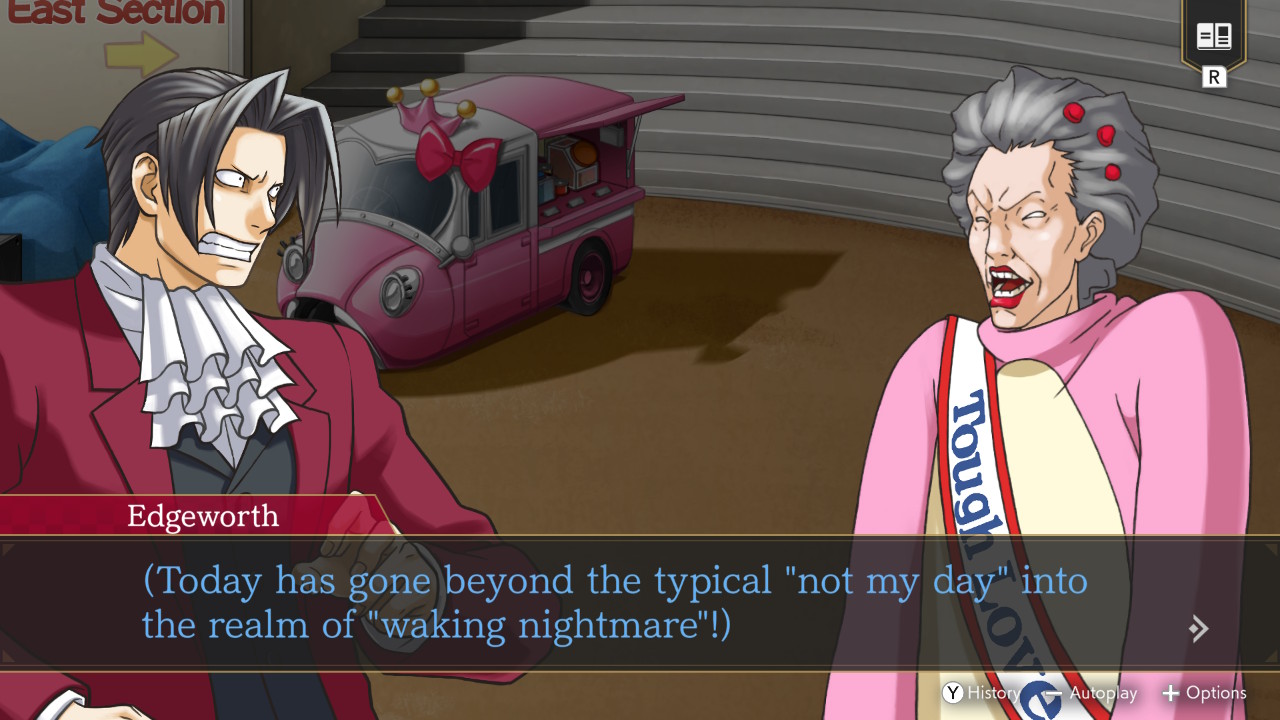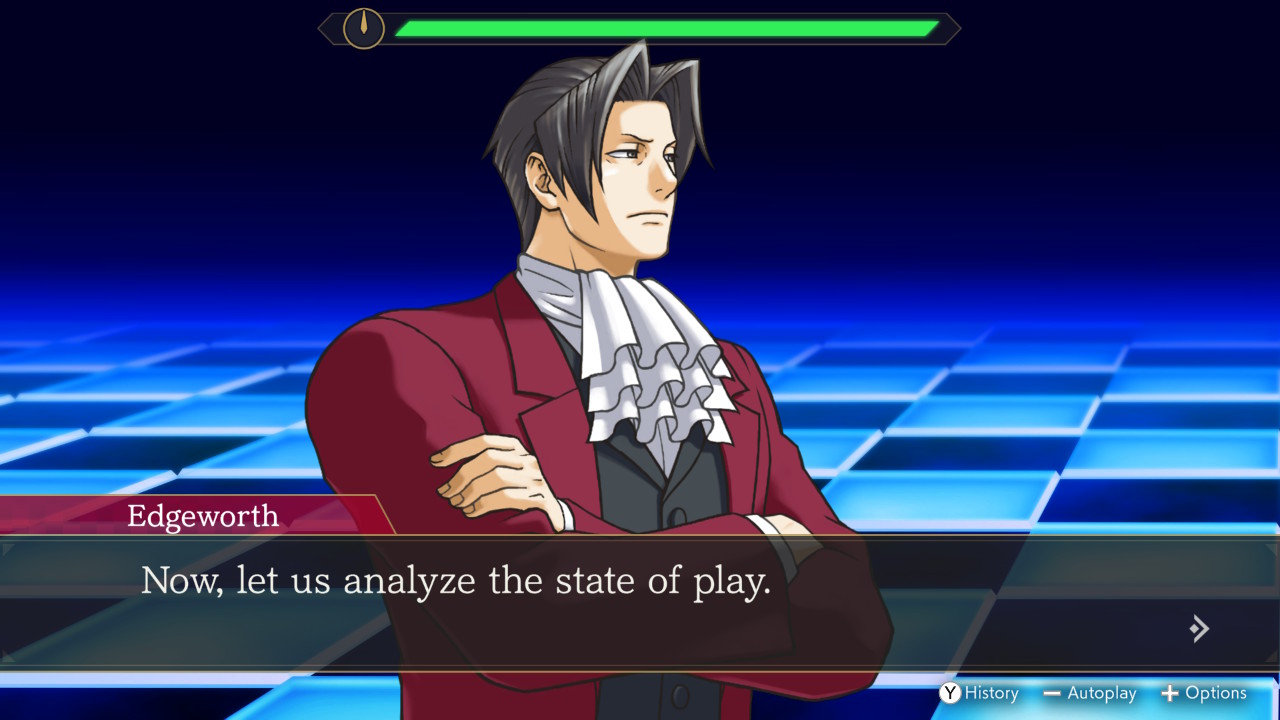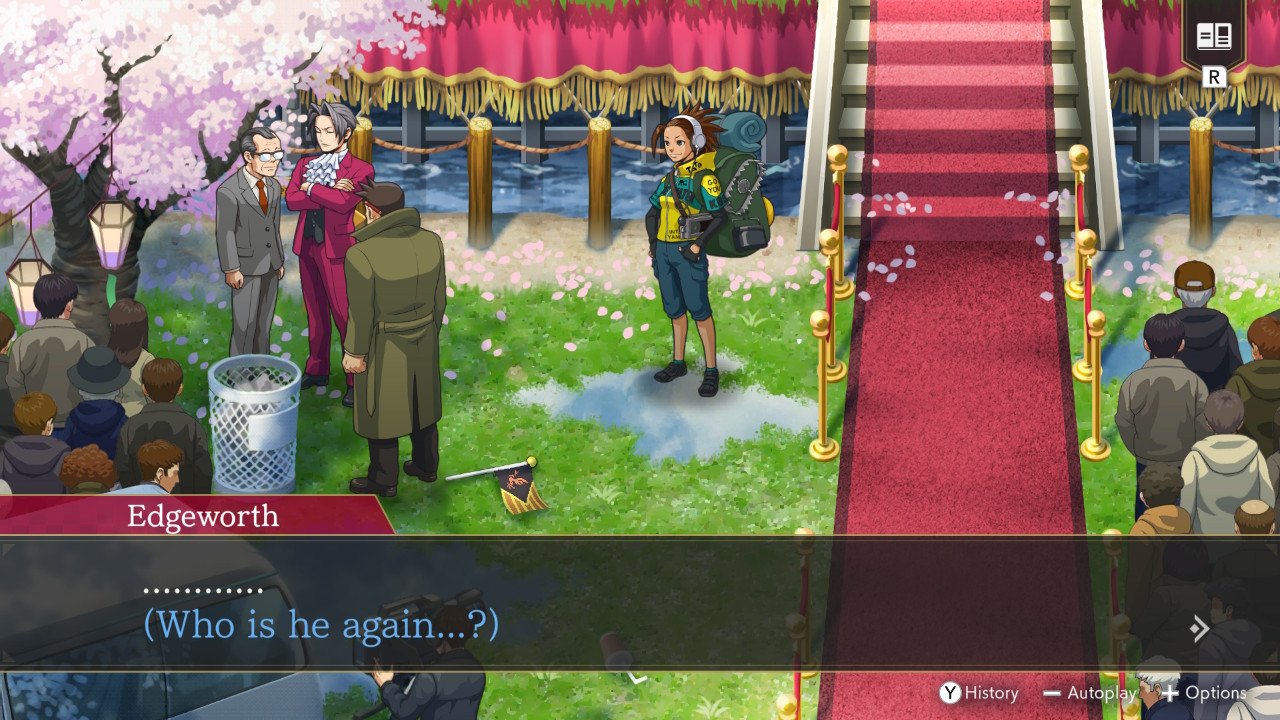[Review] Ace Attorney Investigations Collection
System: Switch
Release date: September 6, 2024
Developer: Capcom
Publisher: Capcom
Although it has been several years since we’ve had a brand new instalment in the franchise, there’s no denying that fans of Ace Attorney have been fairly well catered-to over the last few years. With the arrival of Ace Attorney Investigations Collection, we now have every title in the series (except for the Professor Layton spinoff anyway, which will probably be the next thing we get before a new game) available to us on Switch, including the three that were never released in the West. This collection brings us two entries that take a refreshing approach to the gameplay formula that is definitely worth investigating for fans and newcomers alike.
Ace Attorney Investigations Collection consists of two more titles that were originally released on the DS, those being Ace Attorney Investigations: Miles Edgeworth, and Ace Attorney Investigations 2: Prosecutor’s Gambit, with the latter marking its western debut here. Chronologically these are set after the previously released Phoenix Wright: Ace Attorney Trilogy, but before Apollo Justice: Ace Attorney Trilogy. They are largely unconnected to the narrative of either trilogy, making them a good (although not necessarily the best) jumping-on point for newcomers who might be interested in approaching the franchise.
In terms of length, you’ll be getting less than any of the previous Ace Attorney collection, with both being roughly ten hours long at a stretch depending on your reading speed, although the games are notably more consistent than their predecessors and, dare I say it, much easier to read through at times because of it. The titles in the collection are split across the customary five chapters apiece, but focus on a single main incident rather than a series of largely unrelated cases, as was the case with the main Ace Attorney games. This makes the overall narrative more memorable and much easier to follow along with, and it allows for some clearer character development in its relatively small cast. The writing here is also notably more subtle than in previous entries, as it is not always immediately apparent who the culprit of the current murder is, and both titles seem to delight in throwing red herrings at you, dropping the reveal only when you’re approaching the climax of the chapter. In both games there is a fantastic sense of build-up as you approach the ultimate architect of the series of investigations you conduct in each chapter, resulting in some extremely satisfying payoff when you clear that final chapter.

Of course plenty of familiar faces from the first Ace Attorney trilogy will pop up over the course of both games, although these largely serve as an Easter egg for fans. Your time with the games will certainly be improved significantly if you’ve already played the first three Ace Attorney titles and are familiar with the returning characters and their history, but there are enough fresh faces in here (all of them with dreadful pun-based names, naturally) that you certainly won’t be any worse off if you can’t distinguish the newcomers from the ones who are returning to make Edgeworth’s life more difficult. Although many of the newly introduced characters aren’t anything to write home about and largely serve as one-off persons of interest to the current investigation, the ones that do stick around beyond their initial appearance often have quite engaging story arcs: this is especially true of the second game, which introduces several faces early into the game who will stick through right into its end, featuring prominently as opposition.
But Miles Edgeworth himself is the star of the show, and he brings it all together in a way that is entirely different from his lawyer counterparts. As a more straight-laced and generally uptight personality, his dry wit, pointed observations, and sheer exasperation at the foolishness that everyone around him seems to revel in elevates the trademark quirky humor of the series to new heights. Where Phoenix Wright and Apollo Justice often seemed to simply go along with their current circumstances, Miles Edgeworth is constantly at odds with his, whether that be trying to deal with the bumbling incompetence of his immediate subordinate Dick Gumshoe or restrain the potentially illegal activities of self-proclaimed Master Thief Kay Faraday. The games do an excellent job at displaying his smug satisfaction at being the smartest guy in the room without making him feel aloof and arrogant by frequently putting him at a disadvantage in these interactions, making him a much more likable personality as a result.
Despite the slightly different approach to its narrative, if you’ve played any of the previous Ace Attorney titles you’ll be largely familiar with the gameplay loop, although it is framed slightly differently to make it feel more like a classic point-and-click adventure game than a visual novel. You’ll spend your time investigating crime scenes and questioning key persons of interest to discover the identity of culprit, although where the Ace Attorney titles would strictly divide these two aspects into investigations and trials, the Investigations duology alternates between the two in smaller gameplay segments. You will frequently need to stop examining the crime scene to speak to someone, using the evidence you’ve just gathered to push your argument forward. Overall, it’s an approach to the familiar gameplay that works well and prevents either aspect from dragging on for too long, which is an issue that I occasionally had with some of the longer cases in previous Ace Attorney games.

Investigating crime scenes is done by physically moving around the area to examine points of interest from a third-person perspective, rather than flicking back and forth between different areas from a first-person perspective. This makes the process of discovery much more engaging because although you will enter that first-person perspective when examining an area in greater detail, you’ll need to find it first. Persons of interest are also in the area for you to speak to, and you may need to find some evidence to present to them, or speak to them in sequence, before you can advance the story. There is an element of guesswork here, although the game is quite liberal with hints as to what you need to do, and if worse comes to worst, the Story Mode feature can be enabled so that it’ll automatically play out for you, making it impossible to get stuck advancing the investigation.
The other half of the gameplay involves listening to and questioning persons of interest in your investigation, which takes the same form as the trials in the mainline Ace Attorney games: you’ll be given a statement, which you then need to dissect by pressing for further information and presenting evidence where a statement contradicts it. Although the structure is always the same, the variety of different statements you’ll end up taking and the absence of the courtroom setting makes the process feel far more interactive than the main series; you’re out to prove a theory or make an accusation, rather than defend a client, and this ever-evolving move towards the truth of the matter without the need to fixate on proving the innocence of someone who has clearly been set up is a welcome change of pace.
New to the duology is the need to occasionally connect two pieces of evidence together using Logic to form new evidence that can be used to identify contradictions in statements or move the investigation forward. Logic is the main gimmick in the first Investigations title, and although it presents an interesting way of looking at things it isn’t utilized as often as I would have liked, and it often feels as though you are gathering what evidence you can for the purpose of hurling it at statements, rather than connecting it to form a meaningful picture of what happened. The connections themselves are often quite obvious and only utilized once, although they add another dimension to making progress on solving the case at hand.

The second title, Prosecutor’s Gambit, adds a new gameplay mechanic into the mix, Mind Chess. In this Edgeworth faces off against opponents in a battle of words using a series of multiple choice options to answer their challenge, with the correct answer being based on both an individual’s visual cues and dialogue. Sometimes you’ll need to “Wait and see” before pressing your advantage, or question them about topics in order and use what you’ve deduced earlier to make a point, or catch them out in a lie. Succeed and you’ll knock away their floating chess pieces, breaking down their argument and putting them in Checkmate – which an extremely smug Edgeworth will all too happily proclaim. It’s a slightly more nuanced approach to evidence gathering that requires more strategy and thought than just guessing until you get the right answer thanks to the timer, which refills after each successful move you make, although I found that at times this could be unnecessarily vague as to what the correct answer could actually be.
Like the previous DS titles, Ace Attorney Investigations Collection has some fantastic HD visuals to replace the classic sprites, although the option to use these is present in the menu if you would prefer. It’s especially effective here, as characters have models to move around the scene as well as the partially animated portraits that play out during dialogue, and the animations and facial expressions are all suitably charming, if a little limited at times. In some cases I did notice a slight stutter to character movement during investigations, and an awkward transition between walking and running, although you rarely have to move very far during investigations so this isn’t a glaring issue. The backgrounds have also received the expected improvements and are far more detailed and distinct than they were on the original hardware, allowing these games to shine whether you’re playing docked or handheld.
The usual array of extras have also been added to make this collection feel just as complete as any other: on top of the quality of life improvements in text speed and the addition of story mode, the Gallery feature adds Accolades to unlock for specific actions in-game, a Photo Album and Character Compendium to view the various artwork assets, Documentation of various concept art, and a Music Player. Everything relating to both titles has been collected here, making it quite the treasure trove of information for long-time fans of the series who want a closer look behind the scenes.
The Verdict

It’s wonderful to have (almost) the entire Ace Attorney series available on the Switch at this point, and the Ace Attorney Investigations Collection maintains the high standard set by its predecessors. It is all the more welcome for finally bringing up Prosecutor’s Gambit, which was a notable hole in the collection up to this point. The more freeform gameplay structure makes this worth a try even if you’re not a fan of the other entries in the series, and the more stoic, no-nonsense persona of Miles Edgeworth adds a new dimension to the trademark goofiness of the dialogue outside of its more serious moments. No objections here.
A copy of Ace Attorney Investigations Collection was provided by the publisher for the purpose of this review.
